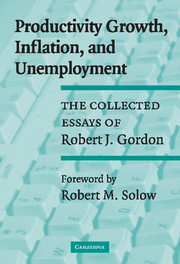Book contents
- Frontmatter
- Contents
- Foreword by Robert M. Solow
- Preface
- Introduction
- PART ONE THE HISTORY, THEORY, AND MEASUREMENT OF PRODUCTIVITY GROWTH
- PART TWO INTERPRETING PRODUCTIVITY FLUCTUATIONS OVER THE BUSINESS CYCLE
- PART THREE THE THEORY OF THE INFLATION-UNEMPLOYMENT TRADEOFF
- Part Three Introduction
- 10 Alternative Responses of Policy to External Supply Shocks
- 11 Supply Shocks and Monetary Policy Revisited
- 12 The Theory of Domestic Inflation
- 13 The Phillips Curve Now and Then
- PART FOUR EMPIRICAL STUDIES OF INFLATION DYNAMICS IN THE UNITED STATES
- Subject Index
- Author Index
- References
Part Three - Introduction
Published online by Cambridge University Press: 10 December 2009
- Frontmatter
- Contents
- Foreword by Robert M. Solow
- Preface
- Introduction
- PART ONE THE HISTORY, THEORY, AND MEASUREMENT OF PRODUCTIVITY GROWTH
- PART TWO INTERPRETING PRODUCTIVITY FLUCTUATIONS OVER THE BUSINESS CYCLE
- PART THREE THE THEORY OF THE INFLATION-UNEMPLOYMENT TRADEOFF
- Part Three Introduction
- 10 Alternative Responses of Policy to External Supply Shocks
- 11 Supply Shocks and Monetary Policy Revisited
- 12 The Theory of Domestic Inflation
- 13 The Phillips Curve Now and Then
- PART FOUR EMPIRICAL STUDIES OF INFLATION DYNAMICS IN THE UNITED STATES
- Subject Index
- Author Index
- References
Summary
INTRODUCING SUPPLY SHOCKS INTO MACROECONOMICS
The Keynesian interpretation of business cycles as reflecting swings in aggregate demand, relative to a relatively stable capacity to supply goods and services, received a body blow in the early 1970s. If demand is moving back and forth along a stable supply curve, then output and price movements should be positively correlated. If supply is moving back and forth along a stable demand curve, then output and price movements should be negatively correlated. The deep recession in 1974–5 was accompanied by an explosion of inflation and thus seemed to deny the Keynesian emphasis on demand fluctuations. In the words of Robert E. Lucas, Jr., and Thomas J. Sargent, quoted in Chapter Seven, “the task which faces contemporary students of the business cycle [is] that of sorting through the wreckage … of that remarkable intellectual event called the Keynesian Revolution. …”
Yet those of us faced at the time with the need to find an interpretation of the 1974–5 episode could not toss out demand as a primary mover of the business cycle. How else, after all, could we interpret the Great Depression, with its bank failures, apple-sellers, and legions drifting from town to town looking for jobs, as anything other than a massive insufficiency of aggregate demand? What event could have restricted aggregate supply to such an extent – bombing raids reduced the productive capacity of the United Kingdom, Japan, and Germany during 1940–5, but not that of the United States in 1929–33?
- Type
- Chapter
- Information
- Productivity Growth, Inflation, and UnemploymentThe Collected Essays of Robert J. Gordon, pp. 305 - 312Publisher: Cambridge University PressPrint publication year: 2003



